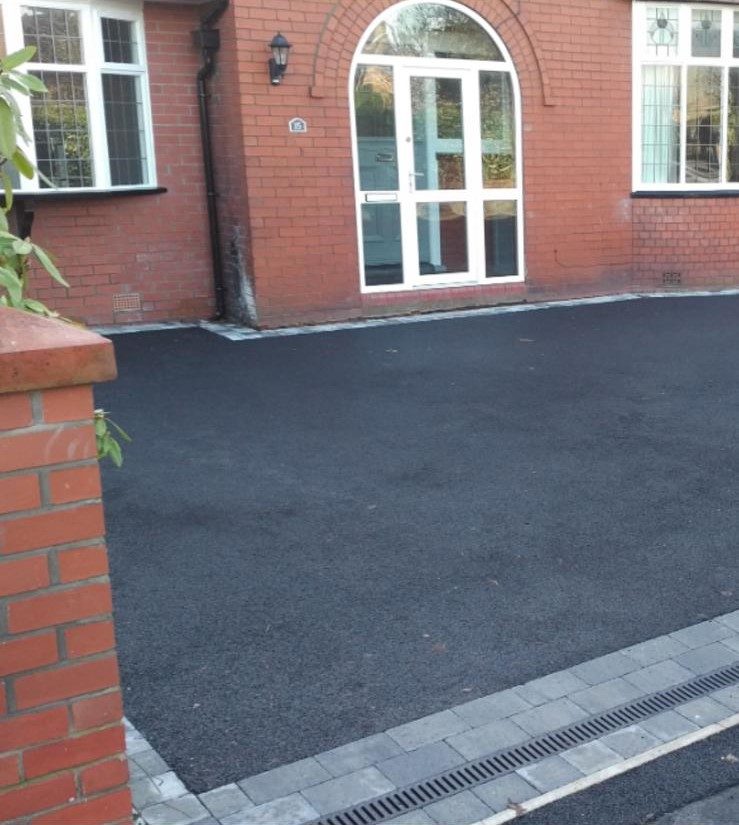A Driveways and patios reflect the house owner’s personality and add value to the property. If you’re thinking about the driveway renovation as part of your property’s upgrade project, a question may arise about the selection of imprinted or blocked concrete. But don’t worry. In this article, we’ll explore the difference between both and learn which one you should pick for your project. So, let’s explore both options and what else you should know about it.
What is Imprinted Concrete?
As the name sounds, imprinted concrete is also known as stamped concrete. It is a decorative form of concrete that is textured or patterned to mimic other materials like bricks, slate, stone, or even wood. Meanwhile, its manufacturing process involves pouring a specially formulated concrete mix over a prepared base and pressing stamps into the surface before it fully sets.
Key Features of Imprinted Concrete
- Aesthetic Appeal: Homeowners choose imprinted concrete because of its incredible ability to mimic natural materials. Whether you want the look of cobblestone, brick, or flagstone, imprinted concrete can achieve the look without the high cost or maintenance.
- Customisation: You can customise the colour and pattern to suit your property’s overall structure and your design preferences.
- Durability: Like standard concrete, imprinted concrete is incredibly durable. It can withstand heavy traffic, extreme weather conditions, and the wear and tear of everyday use.
- Low Maintenance: Imprinted concrete requires less upkeep than natural stone or brick. Even after cleaning and resealing the surface every couple of years, it will keep its appearance as good as new.
- Effective Solution: Although the initial cost of imprinted concrete is 20% more costly than standard concrete, it’s still a reliable option for homeowners who want a premium look on a budget.
Maintenance Tips for Imprinted Concrete
- Use a Sealer: Sealers can improve the durability of imprinted concrete. These waterproof products prevent stains and provide a UV-resistant layer. The surface isn’t affected by sunlight, but it still looks vibrant.
- Don’t Place Rubber Mats: You should avoid placing rubber-backed mats on the stamped concrete, as this blocks the air and causes early wear and tear.
- Avoid Harsh Chemicals: Avoid using harsh chemicals or pressure washers when cleaning imprinted concrete, as these can damage the surface and turn it white.
What is Blocked Concrete?
Secondly, blocked concrete or concrete blocks typically interlock each other to create paved areas. They’re often used for driveways, patios, and walkways. These blocks come in various textures and offer many design options. Unlike imprinted concrete, blocked concrete comprises individual concrete units carefully arranged and fitted together in symmetry.
Key Features of Blocked Concrete
- Variety of Styles: The wide range of colours, shapes, and finishes offers endless design possibilities. You'll find a block style that fits your vision, from traditional cobblestone design to a more contemporary geometric pattern.
- Fireproof: With an ASTM E119 fire rating, it can withstand fire until the rescue arrives at the incident site.
- Easy Repair and Replacement: Yes! If a block gets damaged or cracked, it can be easily replaced without disrupting the surrounding surface.
- Drainage: Since blocked concrete structures are made of individual units, natural gaps between them allow for better water drainage. That’s how areas prone to heavy rainfall can reduce the likelihood of puddles or flooding.
- Flexibility: Blocked concrete is more flexible than imprinted concrete in terms of installation. Its blocks can be arranged in many patterns, and you can add more features like curves or edges. So, it's much easier with blocks than stamped concrete.
- Durability: Blocked concrete is as durable as imprinted concrete and can withstand heavy foot and vehicle traffic. Yet, the longevity of blocked concrete can depend on the quality of the blocks used during the pavement or wall-building process.
Maintenance Tips for Blocked Concrete
- Consider Permeable Blocks: If drainage is a concern, go for permeable blocks, which allow water to flow through the joints. Thus, they prevent puddling and reduce the risk of flooding in heavy rainfall areas.
- Weed Control: The gaps between the blocks can encourage weed growth. You can prevent this by using a weed membrane.
- Check for Movement: Blocked concrete can shift or displace over time. Thus, you must check the gaps or uneven areas and re-level the blocks for a smooth surface.
Which Option Is Right for You?
We hope you understand the major difference between both options and can choose the one that suits your preferences and budget. If you’re still weighing them, don’t worry. You can consider imprinted concrete if you desire a seamless, high-end look with minimal upkeep.
On the other hand, if you're looking for a more flexible and repair-friendly option, go for blocked concrete, which offers endless possibilities. Although both materials are excellent for outdoor surfaces, whichever option you choose, you'll enjoy a beautiful, functional outdoor space that can last for years!
Lastly, if you’re looking for a block paving company, A and M Groundworks has got you covered. We transform dull areas into delightful driveways for a stunning look. So, your house's aesthetics go up, portraying itself as a unique artistic masterpiece whenever someone sees it. For a quote, contact us at 01392984088 or ajmulligan@mail.com.

